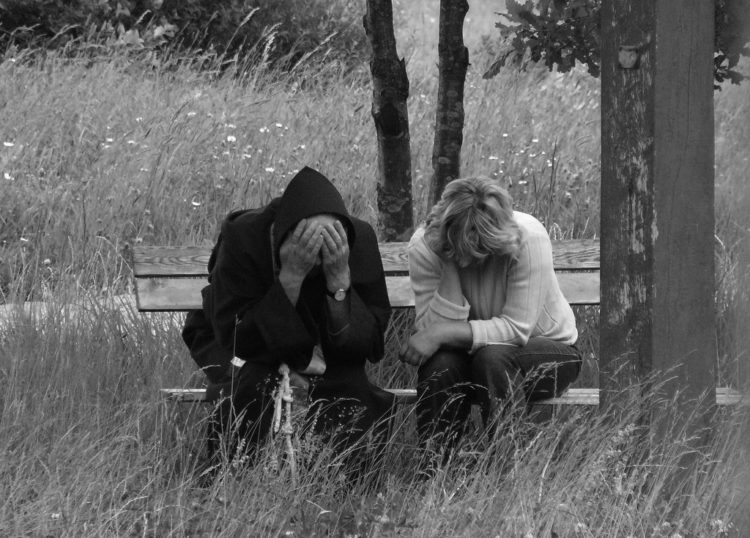On Monday I wrote about the practice of welcoming someone into your story. In particular, the hard parts, the darker parts of our stories. There’s huge risks in sharing the secrets of our lives with other people. What if they see us differently? What if they judge us? And what if they tell other people what we’ve shared?
All of these are risks. Even if you tell the most trusted confidante, sometimes they do see us differently and they may judge us, and yes, sadly enough, sometimes people talk and gossip and our secrets become the fodder they feast upon. But most of the time this isn’t the case. Most of the time if someone sees you differently, it’s only that they see you as more human, more accessible. If they judge you, then shame on them. And, most of the time, people are quite respectful of the sacred bond of confession, because that is what we’re talking about here. Confession.
Over the years I’ve told my share of painful life stories and invited several people into my deepest darkest places, and I’ve also been the one to hear the story, the long sordid tale of someone’s life, and it’s to this that I’d like to turn.
It’s sacred and holy any time someone opens their heart and tells you something painful and deep, something long hidden and covered over with life or shame. When people share their stories with us they invite us into the most true part of their lives, into hidden places. This is holy. This is sacred and demands a kind of light-footedness. Tread softly in these places.
We are not supposed to solve or fix anything about their life. Ever. We are not supposed to suggest ways their story would be useful to the church or in programs or to anyone else for that matter. We are not supposed to compare our own story to theirs and make weak attempts to minimize or maximize their pain.
What are we supposed to do then, when someone shares a story or a secret in their past or confesses an area of pain and suffering?
We are supposed to hold their story and be a witness. We are supposed to be present and love them with kindness and humility.
By the time someone finally opens up and talks about their past, usually they just need to share it with someone in order to feel less alone. Or they need to feel like they’re still human in the aftermath of crazy circumstances and terrible things. They’re not usually looking for solutions. They’re hunting for companions, fellow pilgrims on the way.
I’ve made the mistake of trying to offer solutions and meager words after someone opened up their life to me, and it’s amazing how quickly my solutions squelch the holy in the moment. The more I’m able to practice silence the better off we all are. This is hard learned.
The most important thing about listening to someone else’s story is to remember that this isn’t about you. It’s not your story, it’s not your life, and it’s not your tale to repeat. It’s intimate and private.
What if you think your pastor needs to know? Or the person’s spouse? Or their parent?
In rare cases of life and death or abuse there is a higher protocol that you may need to look to. But most of the time, no one else needs to know, or if they do it’s certainly not your job to tell them.
Stay in your own life narrative. Tell your story and when you’re invited to listen to another person tell theirs, remember it’s sacred and you’ve been invited into something holy.
For Reflection and Conversation: Why is being a witness such a gift and how has that shaped your understanding of the sacred?
Please see below to share this and scroll down to leave a comment.


I practice this everyday in my profession. It’s a real challenge to simply listen and offer guidance, only when asked. I have often thought of making t-shirts that say,”I am not ready for a solution.” Again, thanks for your words. Just read Monday’s too. Love both!
Thank you! I love the idea about the t-shirt. It’s so easy to offer solutions and miss out on the opportunity to simply listen. I do it all the time.
Love hearing from you.
xox
Thanks Tina. It took me many years to learn not to tell, but it’s a life lesson learned. There is someone we can go to and that’s God. We can pray for the person who trusted us. Also, as I was learning this lesson, I sometimes had to say, “I’m sorry, but I don’t want you to confide in me at this time. I’m still learning to be trustworthy for my friends.” Now I can truthfully say I am.
That is such an important point about becoming someone trustworthy. We grow into becoming a confidante and learn how to hold people’s stories. We don’t arrive at that in a day.
Thank you for adding that!
xox
Tina, I was especially struck by two points you made: “We are supposed to hold their story and be a witness,” and “and it’s amazing how quickly my solutions squelch the holy in the moment.” It is easy to forget that people are holy–and their stories are holy. Thank you for your thoughtful and wise words. May we all learn to respect each other deeply enough to recognize that the sharing of story is a sacred privilege. I like David Issay’s mantra that “listening is an act of love.” Your words bear that same weight and add the reminder that when we listen we are on holy ground.
John
Thank you for commenting! Listening is an act of love and one I ache to improve on.
xoxo